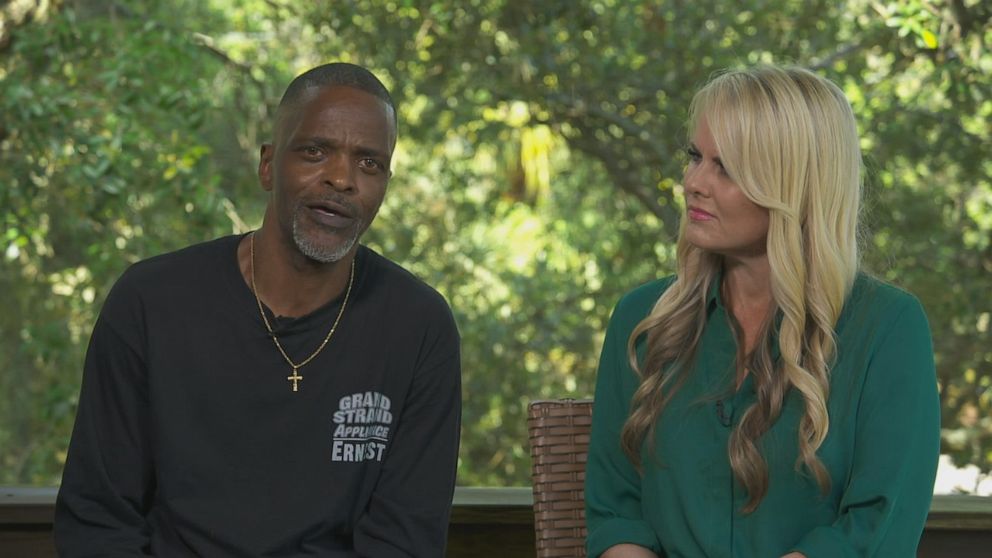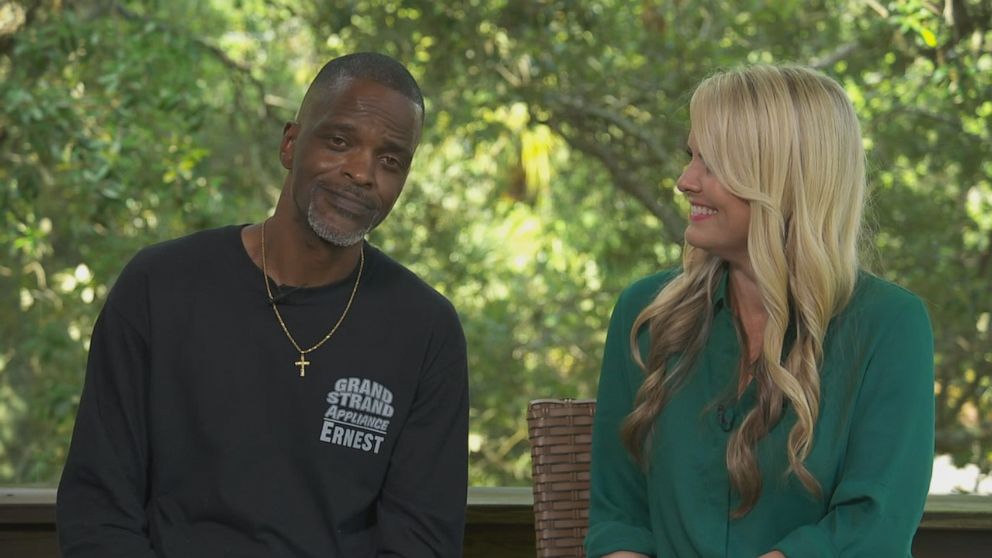How an appliance technician’s conversation about race resonated around the world
Caroline Brock asked her appliance technician about being Black in America.
Ernest Skelton, an appliance technician, was answering a routine call to Caroline Brock’s home in Myrtle Beach, South Carolina, when they shared a conversation about racial inequality that would resonate across the U.S. and around the world.
During his visit, Brock ventured to ask Skelton how he was doing. At first, he thought she was talking about the coronavirus, but she specified that she was curious about his experience as a Black man in the U.S.
She posted about their interaction on Facebook, hoping it would inspire others to have their own conversations about race. Her post went viral, receiving over 180,000 shares.
In their conversation, she said Skelton revealed he gets pulled over at least six times a year.
Skelton’s story shocked Brock, who said in her post, “I can begin healing our country by talking frankly with African Americans in my world---by LISTENING to their lived experience and speaking up.”

“I’ve been walking around here with a lot of anger,” Skelton told “Nightline.” “Because, you know, when you[‘re] sitting here with two [college] degrees and never been in trouble with the law… It's hard for us to survive out here. Speaking with Caroline, you know, all we want is to be heard. And that was the opportunity for me to, you know, get a lot of things that I felt off my chest.”
He said he could tell she was “sincere” and “concerned about what was going on,” especially in her city of Myrtle Beach.
“We had this conversation and her and her husband both was devastated by it,” he said. “You know what I have experienced over the years and how much anger that I was holding and because of … the way I'll be judged.”
Skelton told “Nightline” about how race has played into his professional life.
“One of the boss men, you know, kept calling me ‘boy.’… [It] was very disrespectful. But me being a man, I had to take care of my family and there’s a lot of things that I had to suck in and take, which it was very hard to do,” he said.
“Every time he called me that, I try to get it recorded or when I do ask to speak to human resources, I wrote down and take everything -- told him I’ve been harassed,” he said. “I don’t know what he went back and told them, but I ended up losing my job for that. Because I reported that issue, what was going on. I don’t know if they looked into it or what, but next thing I know, I reported it, and I ended up losing my job.”
Referring back to his experiences getting pulled over, he said for a while, he stopped taking jobs after 5 p.m. out of fear for what could happen to him on the road.
“It's hard because after seeing what happened to George Floyd, and the situation all the way around the country … when we get pulled over for no reason and it's dark, you're terrified,” he said. “That’s a concern that we have – [that] I won't be able to make it home or be able to see another day.”
While Brock couldn’t remember the last time she was pulled over, she said Skelton told her he was pulled over at least six times a year.
“I thought to myself, how would it be to live in a world where you had a curfew basically after dark and the world became a place that was not safe for you after dark?” she told “Nightline.” “That really struck me and touched me deeply.”
Because of the national attention their conversation has garnered, Skelton says he’s now able to work late.
“I spoke with a Sergeant Todd here at the Myrtle Beach and he assured me that if I have any issues that I can go call him directly and he'll look into it,” Skelton said. “That takes some pressure off me. And now I'm able to work late and also and, you know, enjoy working.”
Skelton and Brock have received thousands of messages from all over the world. They told “Nightline” people from Thailand, Singapore, Canada, Greece, Netherlands and New Zealand have reached out.
The comments have been “very supportive and overwhelmed with love, showing love and concern. And it's just ongoing,” Skelton said. “Like Caroline said, we developed a friendship behind the camera; we go to dinner with our spouses.”

They’ve since also attended a protest together, and Brock said the Myrtle Beach Police Department has been looking into its practices.
Brock said she believes their story has empowered people who have been feeling helpless in the face of the coronavirus.
“I think what it did was highlight what we can individually do in our own neighborhoods, in our own towns, which is just open up and start to have some deeper conversations with people,” she said. “I think that I think we become stronger and more robust and less fragile as a nation when we can start to really broach some uncomfortable topics together.”
Brock said she believes it’s a chance for America to “heal from the heart.”
“We can push for policies and laws to protect the most vulnerable and to dismantle parts of the system. And that's really important. But in the south, there needs to also be some heart healing … where we start to change our hearts,” she said. “I don't want to see another four or five generations going by with these issues. America doesn't deserve that. Black people don't deserve that.”
Brock said that she is examining her own biases.
“I am just trying to do the work myself. I'm trying to look into my own heart and to educate myself and to tease out some of the racist beliefs that I know that I have, frankly,” she said. “I know that many people have [them] as we look deeper into this issue and how it affects us. So I'm having really, you know, deep conversations with my spouse and with my friends. Amazing conversations with other Black people who have reached out to me. I feel like my life is so much more enriched.”
Skelton also shared a message to fellow Black Americans.
“I’m saying this from experience, I know you are walking around with a lot of anger and frustration because of the way we've been treated,” he said. “Only thing I can tell you is to find someone like Caroline to open up to and … you see the results afterwards. I'm living proof. If I can do it, then anybody else can do it. It took a lot, but I was able to, you know, open up to Caroline and look where it got me … a friendship and I can’t ask for anything else.”




